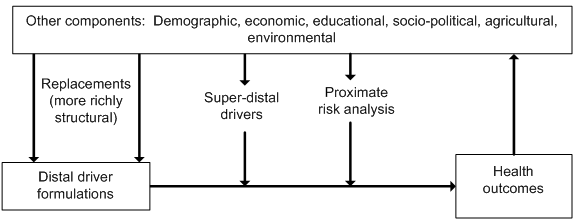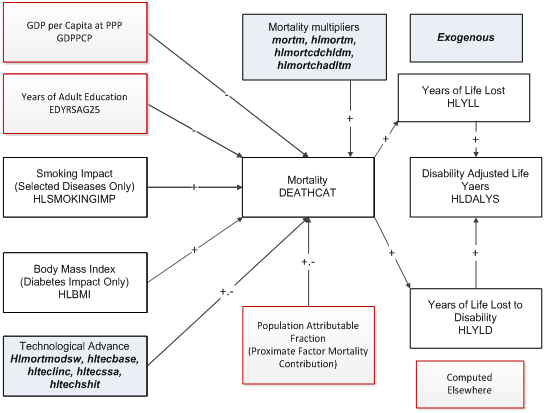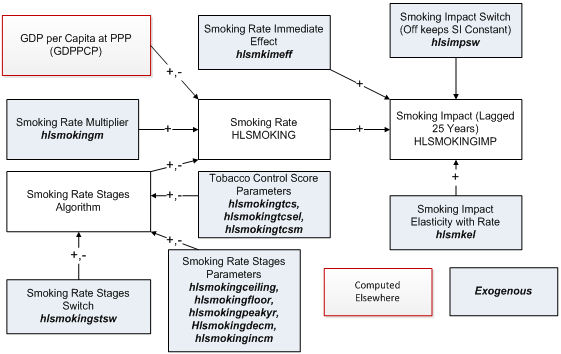Health
The most recent and complete health model documentation is available on Pardee's website. Although the text in this interactive system is, for some IFs models, often significantly out of date, you may still find the basic description useful to you.
The IFs health model allows users to forecast age, sex, and country specific health outcomes related to 15 cause categories (see table) out to the year 2100. Based on previous work done by the World Health Organization’s (WHO) Global Burden of Disease (GBD) project[1 ], formulations based on three distal drivers – income, education, and technology – comprise the core of the IFs health model. However, the IFs model goes beyond the distal drivers, including both richer structural formulations and proximate health drivers (e.g. nutrition and environmental variables). Integration into the IFs system also allows us to incorporate forward linkages from health to other systems, such as the economic and population modules. Importantly, IFs provides the user the ability to vary model assumptions and create customized scenarios; as such, IFs is a tool exploring how policy choices might result in alternative health futures.
This documentation supplements the third volume of the PPHP series, “Improving Global Health,” (Hughes et al, 2011) by providing technical details of health model integration into the IFs system. It includes the specific equations used to forecast outcomes and drivers, relative risk values for proximate drivers, and data manipulations related to model initialization and projection. We intend the IFs model to be fully transparent to all users, and invite comments and questions at http://www.ifs.du.edu/contact/index.aspx.
Cause groups in IFs
Group I – Communicable, Maternal, Perinatal, and Nutritional Conditions
- Diarrheal diseases
- Malaria
- Respiratory infections
- HIV/AIDS
- Other Group I causes
Group II – Noncommunicable Diseases
- Malignant neoplasms
- Cardiovascular diseases
- Digestive diseases
- Chronic respiratory diseases
- Diabetes
- Mental health
- Other Group II causes
Group III – Injuries
- Road traffic accidents
- Other unintentional injuries
- Intentional injuries
Structure and Agent System: Health
System/Subsystem
|
Health
|
Organizing Structure
|
Hybrid structure using distal driver formulations supplemented by proximate drivers; integrated with larger IFs systems such as population and governance
|
Stocks
|
Population by age-sex; stunted population; HIV prevalence
|
Flows
|
Births, mortality and morbidity
|
Key Aggregate Relationships (illustrative, not comprehensive)
|
Distal driver formulations driven by income, education, and time as a proxy for technological advance Proximate driver formulations driven by various social patterns and behaviors
|
Key Agent-Class Behavior Relationships (illustrative, not comprehensive)
|
Behavior related to proximate drivers such as smoking, indoor solid fuel use, obesity
|
Dominant Relations: Health
Health forecasting systems typically can help us either (1) to understand better where patterns of human development appear to be taking us with respect to global health, giving attention to the distribution of disease burden and the patterns of change in it; or (2) to consider opportunities for intervention and achievement of alternative health futures, enhancing the foundation for decisions and actions that improve health.
Broad structural models (e.g., that of the Global Burden of Disease or GBD) assist in the first purpose by relating deep or distal development drivers to outcomes. More specialized structural formulations and the inclusion of proximate drivers open the door to the second, allowing for consideration of interventions in the pursuit of alternate health futures. A more hybrid and integrated model form like that of IFs can help with both purposes and provide a richer overall picture of alternative health futures.
The figure shows the general structure. Formulations based on distal drivers (the GBD methodology) sit at its core. There is no inherent reason, however, that income, education and time (the distal drivers of the GBD approach) should be equally capable of helping us forecast disease in each of the major categories (let alone each of the specific diseases) that the GBD models examine. For example, distal driver formulations tend to produce forecasts of constantly decreasing death rates. Yet we know, for instance, that smoking, obesity, road traffic accidents, and their related toll on health tend to increase in developing societies among those who first obtain higher levels of income and education; with further societal spread of income and education, at least smoking and road traffic deaths (and perhaps also obesity) typically decline.[1 ] A hybrid model can therefore help us identify opportunities for interventions to improve health futures. These interventions might also occur in the form of super-distal drivers (for example, policy-driven human action with respect to health systems). The sociopolitical and environmental modules in IFs act in part as super-distal foundations for variables such as undernutrition and indoor air pollution which, in turn, facilitate analyses of proximate risk factors and human action around them.The integrated nature of the IFs modeling system further allows us to think about feedback loops between health outcomes and larger development variables such as economic progress and population structure.
[1] It is partly for this reason that the creators of the GBD models added exogenous specification of smoking impact to the otherwise mostly monotonically (one-direction only) changing specifications. <header><hgroup>
Health Flow Charts
Overview
Mortality from most causes of death is a function of a small number of distal or deep drivers and a larger number of proximate or more immediate drivers. For two specific mortality types, however, specifically deaths from AIDS and vehicle accidents, there are more specialized representations that rely on a number of more cause-related drivers.
Distal Drivers and Basic Indicators
To forecast mortality related to most of the major cause clusters we use the regression models and associated beta coefficients prepared for the GBD project (Mathers and Loncar 2006). Age, sex, cause, and country-specific mortality rate is a function of income (using GDP per capita as a proxy), adult education, technological progress. For specific death causes, smoking impact (for malignant neoplasms, cardiovascular disease, and respiratory disease) or body mass index (for diabetes only) add to the causality; see the discussion of flow charts and equations for information on the determination within IFs of smoking and smoking impact and of body mass index and obesity.A number of parameters control technology in the distal functions. In the default mode (hlmortmodsw = 1), IFs modifies the technology (time) coefficient in recognition of slower than expected historical progress in many countries, an approach developed in the Global Burden of Disease (GBD project). Those country differences are controlled by hltechbase ,hltechlinc, and hltechssa. Setting the switch value to 0 activates an alternative IFs project approach to the impact of those parameters.
The user can also affect the mortality patterns directly with several parameters, including mortm , which allows simultaneous manipulation of all causes of death and hlmortm , which facilitates manipulation of each cause of death separately. Hlmortcdchldm changes the rates of all communicable diseases for children aged 5 and younger, while hlmortcdadltm affects rates of death from communicable diseases for adults aged 15-49.
Based on the mortality level, it is possible to compute the years of life lost to each cause of death (HLYLL). Using WHO-based estimates, IFs links mortality also to years of living with disability (HLYLD). The sum of the two is disability-adjusted life years lost (HLDALYS).
The forecast of mortality in this figure, dependent almost entirely on distal factors, is not actually the final calculation in the model. See the discussion of the entry of proximate drivers into the discussion of population attributable mortality fractions (PAFs), in interaction with distal-based mortality, for the rest of the story.
Because of the importance of smoking impact in the distal driver formulation, it is important that we elaborate that term. Body mass index is, at this point, only linked to diabetes and we discuss that in the context of the PAFs.
Smoking and Smoking Impact
Of the various specific health risks that the model treats, smoking has a special place because its impact is in the distal driver formulation of the IFs health model. The figure shows that the impact is driven by the rate of smoking (differentiated by males and females) 25 years earlier, with the relationship controlled by an impact elasticity (hlsmkel ). The user can also posit as a nearer term (in the model immediate) impact by setting a switch for that (hlsmkimeff ) at some fractional value of the full delayed impact–the value in the base case is 0.1 or 10 percent. For analysis purposes, another switch (hlsmimpsw ) can turn off the endogenous computation of smoking impact and leave it constant at the initial year value.Smoking rate itself is computed in two different ways. The basic formulation uses only the initial condition and a function linked to the simple and squared values of GDP per capita at PPP. The more extended formulation is an algorithmic one based on the same general concept of a pattern that initially rises with GDP per capita, peaks, and then falls, but with a series of parameters that allow much more control over the stages.[1 ] This staged algorithmic approach (see Lopez et al. 1994; Shibuya et al. 2005; Ploeg et al. 2009) is turned on with a switch (hlsmokingstsw ).
Because control of tobacco is a major policy objective in many countries, there is also a representation of a tobacco control score on a 100-point scale (hlsmokingtcs ) with an associated parameter to control the elasticity of smoking with that score (hlsmokingtcsel ), as well as a multiplier on the score (hlsmokingtcsm ).
Finally, there is a multiplier that allows direct manipulation of the smoking rate, again by sex (hlsmokingm ).


